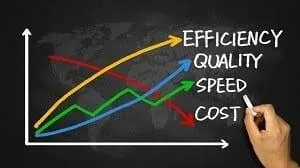Whether you are operating in the service sector or product manufacturing arena, app development is nothing short of a crucial necessity. You need the right team having exceptional app development skills, a comprehensive project plan, and innovative processes.
 All these things will come together to ensure perfect mobile app development. With the ever-increasing demand for dynamic mobile apps, developers need to have all these aspects in place.
All these things will come together to ensure perfect mobile app development. With the ever-increasing demand for dynamic mobile apps, developers need to have all these aspects in place.
It’s right here that you should devise effective and robust strategies for the project. In spite of your efforts, you might come across failures, and that’s because of a multitude of reasons. Identifying these causes is the key to solving the problem.
WHY IS FLEXIBILITY IMPORTANT IN APP DEVELOPMENT?
When it boils down to mobile app development, flexibility seems to be the need of the hour. Without flexible processes, it becomes tough to ensure successful execution of projects. Every mobile app developer should know the three pillars of project management and product development - Time, Scope, and Cost. These factors together determine the quality of a product. Additionally, you will need to which parameter is flexible and to what extent. That will help you integrate several processes into one thus creating and delivering a highly successful product.
HOW DOES IT AFFECT PRODUCTION?
Most of the developers wonder what time, scope, and cost has to do with mobile app development. However, it is these three parameters playing the pivotal role in the entire process.
Time: At times, developers have to execute projects within stipulated deadlines. Under such circumstances, cost and scope of development should be flexible.
Scope: When budget and deadlines are tight, it is the scope demanding flexibility. You can scale back functionalities and features thus delivering ‘minimum viable products.'
Budget: Some of the projects have budget constraints. In that case, the other aspects need to be flexible. Since mobile app development involves iterative approaches, you should take all the processes into account and set the budget accordingly.
The equation is simple. If one of these three parameters is flexible, the other two can be rigid. Where three of them are rigid, projects inevitably fail.
QUALITY MANAGEMENT IN APP DEVELOPMENT
Let’s take a look at the crucial processes involved in mobile app development. If you consider the software development life cycle or SDLC, you will come across the following steps.
Conceptualization: App development begins with conceptualization. With flexible thoughts and continuous flow of ideas, you will have the chance to create dynamic apps.
Testing: Flexibility plays the pivotal role in performance testing. Mobile app developers need to test their app’s performance before releasing it in the market.
Q&A: If you are working on mobile app development projects, quality assurance will turn out to be an important part of the project. With agile development methods and flexible processes, you can create stunning apps.

SIGNING OFF
What we get to know is flexibility is critical to the success of mobile app development projects. If you are creating an application, make sure you have flexible boundaries as that will lead to dynamic and highly functional apps. Get in touch with us at info@continuumsoft.ca for a free consultation to turn your unique mobile app development idea into a real success.
